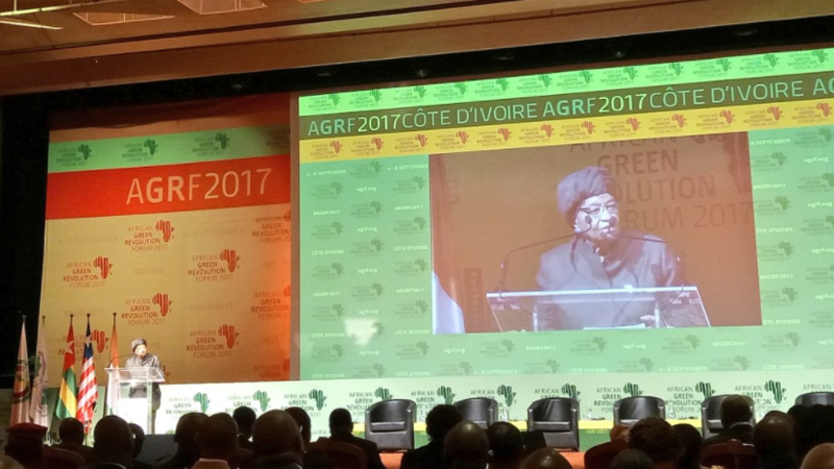
ABIDJAN — This year’s African Green Revolution Forum began Wednesday, convening ministers, donors, civil society and business leaders to discuss how to transform Africa’s agriculture sector.
This year’s focus is on how to improve and boost jobs in the sector, drawing particular attention to the needs and challenges facing small-scale farmers, who bear the brunt of climate change shifts, security threats and lacking rural infrastructure.
Smallholder farmers manage up to 80 percent of the farmland in sub-Saharan Africa. And though they feed roughly 2 billion people, these farmers themselves represent an overwhelming percentage of the continent’s malnourished and impoverished population. Encouraging smallholder farmers to develop their skills into sustainable businesses could help improve food security and generate poverty-reducing economic and agricultural growth.
The 2017 Africa Agriculture Status Report predicts that the continent’s local food market will reach a value of $1 trillion dollars by 2030. Experts realize the urgency of harnessing the agriculture sector’s potential now by addressing areas of concerns and committing to action — or else risking the food market becoming saturated with imported food items.
Creation of agribusinesses and 'agripreneurs' key topics at AGRF
Agriculture experts at the African Green Revolution Forum urged Africa to transform the sector by creating more agribusinesses and providing a stable and enabling environment for private investors. Experts also discussed the need for capacity development of smallholder farmers to increase yields.
Private sector as well as bilateral and multilateral donors are largely aligned on their commitments to African agriculture. The African Development Bank has pledged $24 billion toward agriculture over the next 10 years, including its ENABLE Youth program that seeks to develop unemployed graduates into “agripreneurs” within each stage of the agribusiness value chain. The Bill & Melinda Gates Foundation, meanwhile, has committed $5 billion over the next five years to expand their work in crop and livestock research.
Like editions prior, this year the AGRF coordinators expect several announcements of new business contracts between the private sector, small and medium enterprises, and communities of smallholder farmers, especially in commodity value chains of interest to smallholder farmers, such as the regional rice value chain. Last year, partners pledged more than $30 billion in investments.
Here are three things to watch this week.
1. Building up smallholder farmers
Smallholder farmers will be key to improving agriculture in Africa. This year’s forum focuses on building smallholder farmer resilience to climate change, promoting agripreneurship and supporting agricultural research, technology and innovation to grow agribusiness. Participants are also likely to address how to build better skills and capacity across the sector.
The conversation kicked off with a pre-forum event on how to improve the role of women in smallholder agriculture, including by increasing their access to land and finance.
“Women must be represented by market integration and financial alignment,” said Beatrice Gakuba of the African Women’s Entrepreneurship Group at the event. “We must change our thinking that women must be limited to small scale forever. We have to do something to increase their access to more.”
2. Policy reform to promote food security
Policymakers are considering how to build long-term strategies that create a stable and predictable regulatory environment for agriculture inputs, finances, services and market access. African countries change policies too quickly, which hinders investors and disrupts the industrialization process, Li Yong, director-general of the United Nations Industrial Development Organization, said during a recent interview.
See more related stories:
▶ Boosting agriculture could mitigate African famine threat in a warming world
▶ Opinion: Investment in agriculture is at the heart of sustainable development success
▶ Q&A: IFAD's outgoing president on the continuous need of rural transformation
Countries must have a vision and a strategy, Yong said. “Provide an environment for SMEs to thrive and link agriculture to agro-industry, agribusiness and manufacturing,” he suggested.
While some countries have established cross-sectoral, comprehensive policies, others still have policies that consider agriculture independently of other parts of the economy. “The foundation of such commitment [to develop the agriculture sector] must occur, and be reinforced, at the country level,” Sheryl Hendriks, professor of food security at University of Pretoria, told Devex earlier this week.
The World Bank also recommends building institutions that help farmers access land and engage in commercial agriculture and providing supportive incentives for farmers and agribusinesses.
3. Announcement of the Africa Food Prize winner
More than 600 applicants from across more than 20 African nations applied for this year’s prestigious honor — and the $100,000 prize — which spotlights bold initiatives and technical innovations that can be replicated across the continent toward improving the quality and availability of nutritious food.
The $100,000 prize recognizes innovative individuals or institutions that are leading the effort to change the reality of farming in Africa from a struggle to survive, to a business that thrives. It puts a bright spotlight on bold initiatives and technical innovations that can be replicated across the continent to create a new era of food security and economic opportunity for all Africans.
The 2016 laureate was awarded to Dr. Kanayo Nwanze, the former president of the International Fund for Agricultural Development, for his advocacy for rural development, success in advancing agricultural policies and dedication to placing African smallholder farmers higher on the global agenda. Prior winners include Dr. Ousmane Badiane, Africa director for the International Food Policy Research Institute, and AfDB President Akinwumi Adesina.
The 2017 winner will be selected by the Africa Food Prize Committee, chaired by former Nigerian President Olusegun Obasanjo.
Stay tuned for more Devex coverage of the African Green Revolution and follow Devex West Africa Reporter Christin Roby @robyreports for updates.








